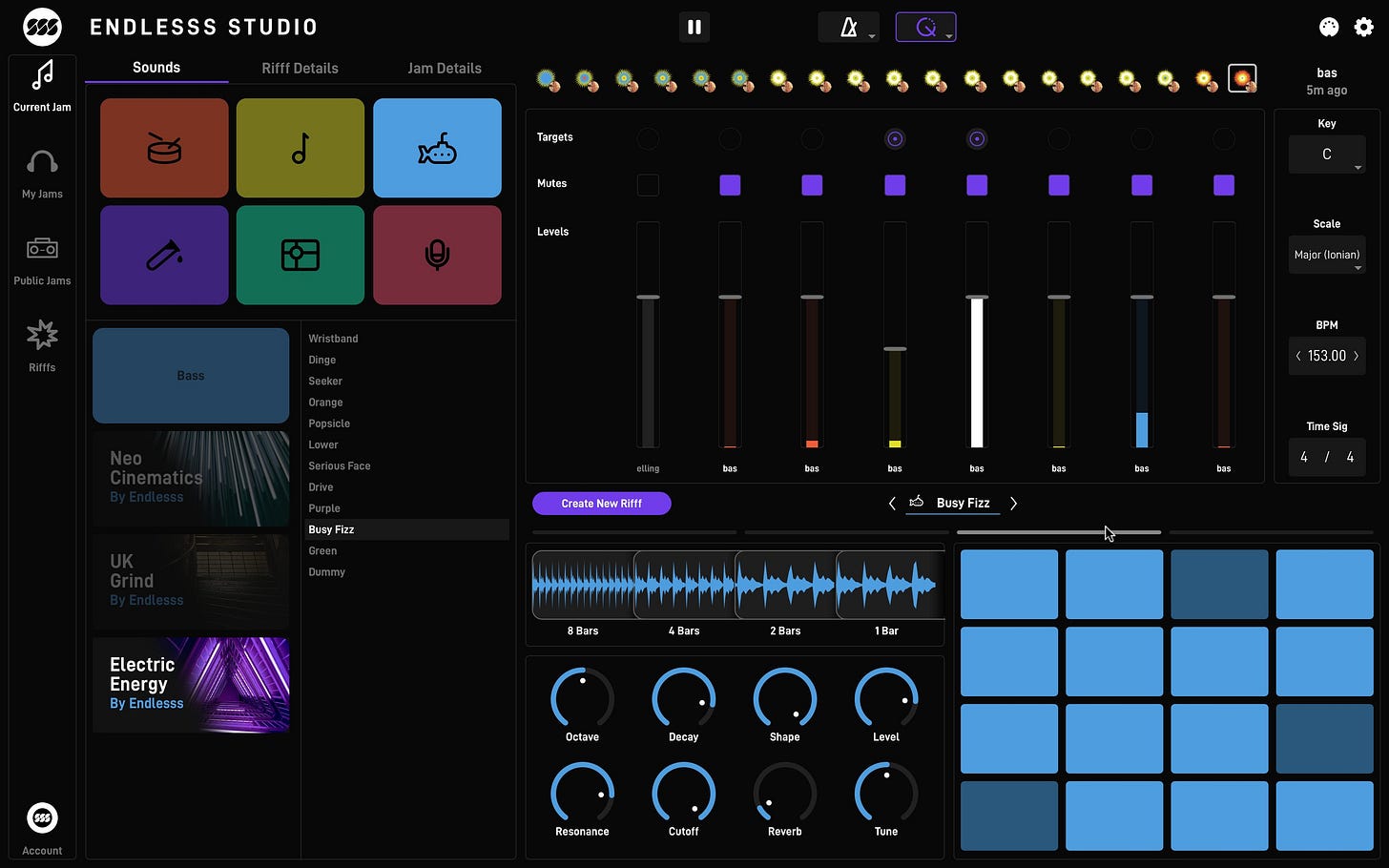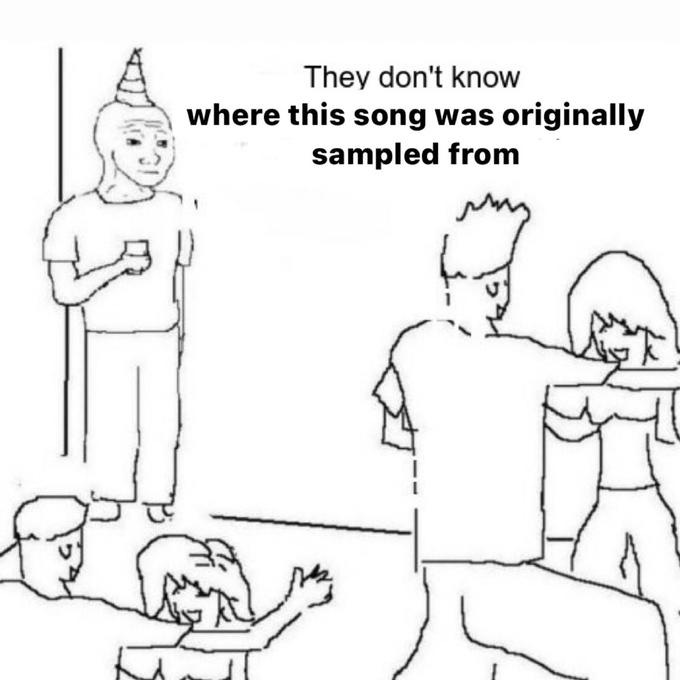✖ Music's non-static future as seen through music making app Endlesss
And: Segmenting the TikTok stardom pipeline; WMG invests in Roblox; Dr. Fauci predicts theatre reopening in fall; online communities for black music discourse
For those unfamiliar with Endlesss: it’s a collaborative music making app founded by musician Tim Exile that has been on the market as a (free) mobile app for a while already. In December, Endlesss launched its desktop app which I’ve now given a go and it provided a glimpse of how music is reconquering a quality it has lost in the age of the recording: participation.
Why Endlesss is different
Instead of writing songs, the app’s users are encouraged to make ‘jams’ which essentially are iterative loops of up to 8 bars. Each iteration is called a riff. When you add an instrument or effect to a riff, it creates a new riff inside your jam which then plays as a loop. The audio keeps playing, the interface keeps staring at you, encouraging you to keep jamming.

The app is also social, allowing users to participate in jams with others or just to listen in and explore riffs. There are prominent public jams that everyone can participate in as well as invite-only ones. Some of these jams lead to users sharing interesting moments of the jams (riffs) to the community, which can then be remixed and used to kick off another jam. Pretty cool considering some of the app’s users are popular producers themselves (Imogen Heap and Ninja Tune co-founder Matt Black joined Endlesss founder Tim Exile for livestreamed jams last year).

How Endlesss redefines music
The social dimension, culturally speaking, is Endlesss’ most important aspect, because it changes the default meaning of music. For people who are not creators, music is something you listen to. It’s the same every time you hear it and it doesn’t change. If a remix or a cover version is made, it’s considered as ‘less real’ than the ‘original version’ (which in some cases may just be the most famous version, but not the first recording).
These are new qualities of music - at least as a default - introduced by the age of recorded music and mass consumerism. Music has become less participatory in that you don’t need anyone to play or sing a song if you want to hear it. The fact that it’s a new quality also means that it’s not inherent to music, meaning we can use the power of our devices (now easily amplified by connected AI) to experience music in new ways.
In the case of Endlesss, that means music is not a song, but an iterative jam. It’s something that happens, that invites participation, and that changes over time (though a snapshot of each iteration remains on the platform as a riff).
The age of non-static
This trend extends way beyond Endlesss and goes decades back to ‘affordable’ drum computers and samplers sparking the foundations of today’s most popular genres: house and hiphop. Then we got the rapid interchange of ideas and remixes enabled by Soundcloud which enshrined the platform’s cultural influence into genre names such as cloud rap. Outside of music, internet meme culture evolved through remixes and iteration, providing a non-linear visual culture detached from the channels of mass media and behaving according to the network reality of the internet.

For the connection back to music, you only have to look at today’s hottest social media company, TikTok, which is completely based on remix culture. I’m not saying Endlesss is the TikTok of music production software; I’m saying that there’s a generation of people for whom the primary point of interaction with music is through a new set of interfaces that make music more than just its static, recorded self. It’s participatory and made to be engaging, like live music… but scalable.
Bas Grasmayer
Become a supporter
Your support helps me cover costs and dedicate more time to research and sharing insights. If you can afford it, consider becoming a MUSIC x SUPPORTER on Patreon. Alternatively, you can sponsor my morning coffees.
TECH
🎤 User-centric payments, but the content is videos of concerts. A Swedish startup named Staccs plans to launch a video streaming service for live music and divide each user’s subscription revenue among the rightsholders of the viewed concerts.
📱 Dan Runcie of Trapital lays out how talent gets left behind in the current TikTok to stardom pipeline and calls for a segmentation:
“There’s an opportunity for new TikTok-focused indie record labels and distributors to meet artists where they’re at.”
📈 Music attorney Chris Castle has written an interesting perspective which asks Spotify to consider sharing more money with artists based on their share valuation. He argues that the streaming royalty debate is a distraction from the (share) value being generated and the lack of participation musicians have in that. This participation is actually a common thread that almost all newcomer streaming services like Resonate (a cooperative) and Audius are prioritizing. (I don’t fully agree with all the thoughts in the piece, but good criticism of platform economics nonetheless)
👾 Roblox is now valued at nearly $30bn after a $520M investment round that included Warner Music Group. Also a reminder that Sony has a $250m in Epic Games (owner of Fortnite). Year of the metaverse?
👨🏻🎤 Labels keep figuring out ways to generate popularity for the work of legacy artists. WMG and Sony Music partnered with David Bowie’s estate to create a TikTok profile. Some other artists who never saw TikTok, but still have profiles are John Lennon, Prince, and Freddie Mercury. (h/t Music Ally)
CORONA
😷 If vaccine distribution is successful, Dr. Fauci believes theatres can reopen safely by autumn, provided they have good ventilation and proper air filters. He expects that asking audience members to wear masks will continue to be the norm for some time.
💸 The US National Independent Venue Association has made $3M in short-term grants available while venues wait for funds expected from the Save Our Stages Act. However, NIVA was only able to grant 1 out of 4 requests and needs an additional $11 million to provide essential relief to all who have applied thus far.
🚗 This year in music is going to look a lot like last year, but without the surprise and with a lot more experience. Most organisations had to reinvent themselves, like CBF Productions who launched drive-in concept Concerts In Your Car using their PPP loan, and are now preparing for another pandemically challenged summer:
“There’s no way it’s going to be like what it was, and we’re not interested in figuring out how to do it 25-50% capacity, it was already hard at 100%. We’re really wanting to figure it out and double down on this model and figure out new revenue streams. Every day is a new challenge.”
👩🏿💻 Makua Adimora discusses the online communities that evolved during the pandemic, from Verzuz to No Signal to Clubhouse and what they have meant for Black music discourse.
🇬🇧 The Chair of the UK Parliament’s culture select committee has called for the creation of a government-backed insurance scheme to cover festivals and live music events, to provide some much-needed certainty or at least take away risk in an uncertain 2021.
✖ MUSIC x, founded by Bas Grasmayer and co-edited by Maarten Walraven.
❤️ patreon - twitter - musicxtechxfuture.com - musicxgreen.com



